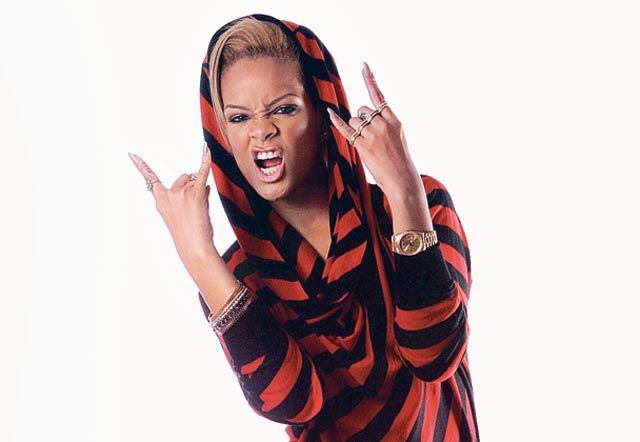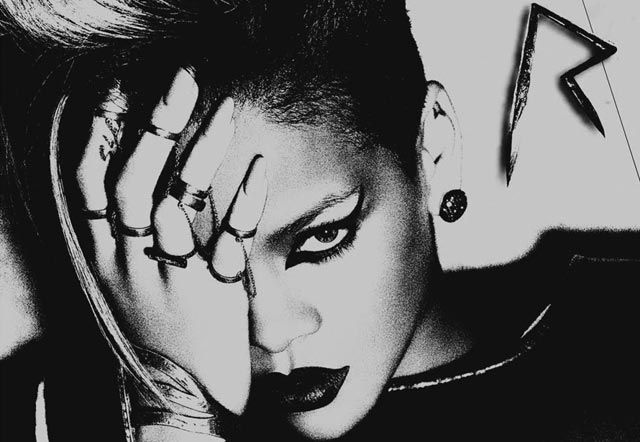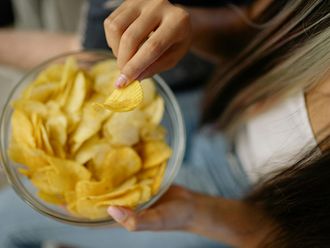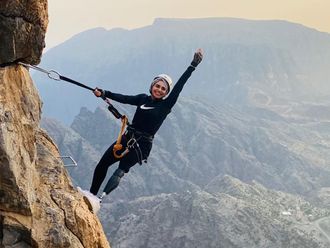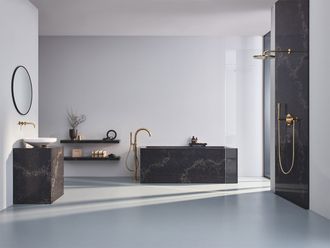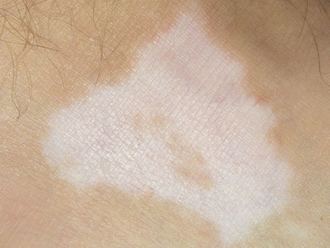Rihanna's head soars above the cloud of stylists, photographers, PR people and managers that mill around her, completely disproving the notion that celebrities tend to be smaller in real life.
In her strappy, stompy gladiator heels, with a bronze helmet of hair, long beige nails, eyes rimmed with bright pink shadow, she is statuesque, towering, a picture of power. As the photographer clicks, a series of perfect images appears on the monitor, not a single one mid-blink or slack-jawed.
This professional focus is one side of the R&B singer. The other is playful, uproarious, a reflection of the fact that Rihanna is still only 21, and determined to enjoy herself. And so, before the shoot starts, she mugs and mimes ridiculous poses; she asks her make-up artist to cover a small bruise on her leg, whooping in explanation: "I had some really wild sex last night, just kidding!"
Super styling
She goes for lunch in a side room with her entourage, including old friends from Barbados, and laughter gasps through the closed door. When I ask whether her hard-edged style futuristic dresses, mesh jumpsuits, trouser suits with enormous, exaggerated shoulders owes anything to Grace Jones, she says that she loves her, "but Cruella de Vil, from 101 Dalmatians, is my new style icon. She's just fly". Her laughter sometimes seems forced her unhappiest stories can end with a "ha!" but mostly it comes across as real.
Of course, none of this tallies with the most notorious image of Rihanna to emerge this year, in a picture taken in February by the Los Angeles Police Department. It was snapped at the end of an evening that had started well, with Rihanna and her then boyfriend, Chris Brown, who was 19 at the time, hanging out at a pre-Grammy Awards party. Both were scheduled to appear at the awards ceremony the next evening, but it wasn't to be: when they left the party, Brown attacked Rihanna in their Lamborghini. It was then claimed that he shoved her head against the car window, punched her repeatedly in the face, bit her left ear, bit her fingers and placed her in a headlock until she began to lose consciousness.
The photograph of Rihanna should never have been made public, but it was leaked to the gossip website TMZ.com. Here was a beautiful young woman who had recorded three successful albums in two years (her most recent, Good Girl Gone Bad, went multi-platinum), she was the first Barbadian to win a Grammy, had spent 10 weeks at No 1 in the UK with her irresistible 2007 hit Umbrella. There was shock at suddenly seeing her as a victim her eyes were lowered, her skin swollen, there were welts to her forehead, bruising and marks to her mouth and cheeks.
The picture gave the lie to the stereo-type of domestic violence victims as older, obviously downtrodden women. It showed, as Rihanna has said herself, that this could "happen to anyone".
On her new album, Rated R, Rihanna plays with this new public perception of her. The cover of the first single, Russian Roulette, for instance, shows her wrapped in barbed wire, while the video depicts her, variously, in a police cell, facing a man with a gun, abandoned on a road, and with blood seeping through her skin. Then there are the lyrics to the song Stupid In Love ("My new nickname is you idiot... I still love you, but I just can't do this"), and the photo shoot for the September issue of Italian Vogue in which she was pictured in a muzzle.
Growing up
Robyn Rihanna Fenty was born in 1988, in Barbados, and grew up "in a slightly less than average neighbourhood", she shrugs, "It wasn't the poorest, and it definitely wasn't the richest." And she always knew she wanted to sing. She was determined to succeed, but there were no singing lessons to be had, no dancing lessons, and serious problems at home. Her father, Ronald, was a crack-cocaine addict who was physically abusive to her mother, Monica. Since Rihanna describes her mother as "one of the strongest women I know, if not the strongest", the abuse must have been bewildering.
Then there was the added psychological confusion of loving someone who was abusive. When she remembers the positive moments of her childhood, Rihanna says she always thinks "about learning to swim, learning how to ride my bike, and it's funny, because most of these times were with my dad". But as she grew older, there was a time when she "hated him. Then, one of my school friends, who I was very close to, she knew, and she always used to say, ‘You can't hate your father,' that you have to love him, at the end of the day, because he's your father. So I listened, as much as it took out of me."
As a child, Rihanna says, she "was a nerd. Too nerdy. I read all the time." But as she moved into her teens, her interest in school waned. At lunchtimes she would sing with a couple of other girls nothing serious until one day one of them set up an audition with a family friend, US songwriter and producer Evan Rogers, who was on holiday with his Barbadian wife. "We sang as a group," says Rihanna, "and then we sang individually, and Evan expressed an interest in helping me get a solo deal."
I expect her to say that this was a brilliant moment, but her mouth turns down. "It was a really difficult place to be, because obviously I didn't want to hurt my friend's feelings, I didn't want to betray her, but it was a reality. We had auditioned together, and individually, and that was it."
Rumours everywhere
At 15 she began travelling between Barbados and the US to work on ademo. At 16 her songs were taken to Jay-Z, then president of Def Jam Recordings, who immediately signed her up. Again, it should have been an exciting time — her first single, the summery, dance hall-tinged Pon De Replay, was a sizeable hit, but nasty gossip took the shine off her success. "It was like, ‘Of course she had to give [Jay-Z] a blow job to get that deal.'
"That rumour was everywhere in Barbados, and it was so disgusting it made me feel really weird. I would even be weird around Jay-Z. I wouldn't be able to look him in the eye. One day he called and he was like, ‘Yo, you can't buy into these rumours, you can't let people move you with anything they say.' The rumours started getting very funny to me after that."
Ironically, in a year in which she's been portrayed as a victim, Rihanna actually seems happier and more in control now. "Absolutely," she says, "and I kind of had to fight for it. In the beginning it was almost like I was just going along with a script that was written for me, and I didn't feel like an artist, I felt like a tool. I just felt, hey, here I am, this money-making vehicle for this big record label [and] I'm not even having fun.
"Then, finally, I said, ‘You know what, if I want to do this, I'm going to do it my way' and I just rebelled, cut my hair, dyed it black, changed my image, changed my sound, and now we're still evolving because I'm 21, I'm still growing. I've been through a lot in the last two years, especially in the last year or so. It definitely forced me to do some growing up."
We start talking obliquely about the assault. "A whole thing happened overnight this year," she says, "the night before the biggest performance of my career, as well as 10 days before I became 21. It was a turning point. It was the end of an incredible year, an incredible album [Good Girl Gone Bad], the beginning of a new era, and it just felt like it was a wake-up call for me, and it had to happen. As bad and as terrible as it was, there's so much great that came out of that situation."
I must look surprised, but she continues. "Even for him [I assume she means Chris Brown], like, he knows now that he's never going to do that again. And now, young girls also, they learn from it, and I really hope young men can learn from it."
Would she ever use her experience to help others? She says yes, but "I don't want that stamp going across my head as a victim of domestic violence." She pauses. "As much as I was, that's a part of my life that I want to throw away, that I never want to go through again."
Being strong and open
I ask how she felt about the leaking of the police photograph. "It was a confidential case, by law," she says, "so when it became about getting a cheque, and completely disrespecting somebody else's privacy, it was just disappointing. I expect that from TMZ, but if the police can't protect you, then you can't be safe. You just feel completely exposed. And I was very disappointed."
She recently came up with a great phrase to describe her situation, saying that on the night of the attack, she went to bed as Rihanna and woke up as Britney Spears. But if she's determined not to be cast as a victim, she still strives to take something positive from the publication of the photographs.
"Before, young girls would look at me, and they thought my life was perfect, but now they realise that it's not. Nobody's perfect. I'm living the same human life that they are, just with a more public career and when they realise that I do go through dumb stuff like that all of a sudden that makes me human for them. So now I feel really strong, but I also feel very open."
In a good way? She smiles widely. "In a great way."
What Rihanna sings in the shower
Young Rihanna would croon in the shower to her favourites: "The divas," she sighs happily. "Whitney Houston, Celine Dion, Mariah Carey, Shania Twain. I loved Luther Vandross. Still love him. And reggae was standard. You always listen to reggae in Barbados."


